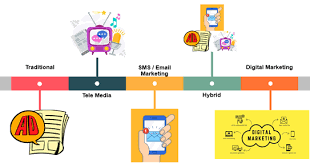The Importance of Lead Generation in Digital Marketing
In the world of digital marketing, lead generation is a crucial aspect of any successful campaign. Lead generation involves attracting and converting potential customers into leads – individuals who have shown interest in your products or services and are likely to make a purchase.
There are various strategies that digital marketers use to generate leads, such as content marketing, social media marketing, email marketing, and search engine optimization (SEO). These strategies help businesses reach their target audience and engage with them in a meaningful way.
Benefits of Lead Generation
Lead generation plays a vital role in the success of a business. Some key benefits include:
- Increased Sales: By generating quality leads, businesses can increase their sales and revenue.
- Targeted Marketing: Lead generation allows businesses to target specific demographics and reach potential customers who are more likely to convert.
- Improved ROI: Effective lead generation strategies can result in a higher return on investment (ROI) for businesses.
- Building Relationships: By engaging with leads through personalized content and communication, businesses can build lasting relationships with customers.
Best Practices for Lead Generation
To maximize the effectiveness of lead generation efforts, it is important to follow best practices such as:
- Create Compelling Content: Produce high-quality content that resonates with your target audience and provides value.
- Optimize Landing Pages: Design landing pages that are user-friendly and optimized for conversions.
- Use Calls-to-Action (CTAs): Encourage visitors to take action by incorporating clear CTAs throughout your website and marketing materials.
- Analyze Data: Monitor key performance indicators (KPIs) to track the success of your lead generation campaigns and make data-driven decisions.
In conclusion,
Lead generation is an essential component of digital marketing that can drive business growth and success. By implementing effective lead generation strategies and following best practices, businesses can attract quality leads, nurture relationships with potential customers, and ultimately increase sales and revenue.
Unveiling the Essentials of Digital Marketing Lead Generation: Key Steps, Common Methods, Core Purpose, and Strategic Approaches
- Which are the 4 steps of the lead generation process?
- What is the most common lead generation?
- What is the purpose of lead generation?
- What is a lead generation strategy?
Which are the 4 steps of the lead generation process?
In the realm of digital marketing, the lead generation process typically consists of four key steps. The first step involves attracting potential customers through various marketing channels such as social media, content marketing, and SEO. Once leads have been attracted, the next step is to capture their information through forms or other means to initiate contact. Subsequently, leads are nurtured by providing them with relevant and valuable content to build trust and engagement. Finally, the ultimate goal is to convert these leads into customers through targeted marketing efforts and personalized communication strategies. These four steps form a structured approach to lead generation in digital marketing that aims to drive successful customer acquisition and retention.
What is the most common lead generation?
The most common lead generation method in digital marketing is through content marketing. Content marketing involves creating and sharing valuable, relevant content to attract and engage a target audience. By providing informative and engaging content such as blog posts, articles, videos, and infographics, businesses can capture the interest of potential customers and encourage them to take action, such as signing up for a newsletter or requesting more information. Content marketing is a highly effective lead generation strategy that helps build brand awareness, establish credibility, and drive conversions in the digital landscape.
What is the purpose of lead generation?
The purpose of lead generation in digital marketing is to attract and capture the interest of potential customers, known as leads, who have shown a likelihood of becoming paying customers. By generating leads through various marketing strategies such as content marketing, social media marketing, email campaigns, and SEO efforts, businesses can build a pipeline of prospects that can be nurtured and eventually converted into sales. Lead generation helps businesses target their marketing efforts more effectively, engage with their audience in a meaningful way, and ultimately drive revenue growth by converting leads into loyal customers.
What is a lead generation strategy?
A lead generation strategy is a carefully planned approach that businesses use to attract and convert potential customers into leads. This strategy typically involves a combination of marketing tactics aimed at engaging with the target audience and encouraging them to take a specific action, such as signing up for a newsletter, downloading a whitepaper, or requesting more information about products or services. By implementing a well-defined lead generation strategy, businesses can effectively capture the interest of potential customers and nurture relationships with them to ultimately drive conversions and increase sales.




